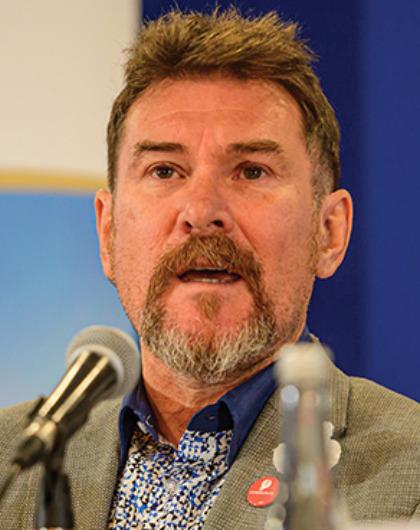Scholars
John Barry
Queen's University Belfast
Based in
United Kingdom
Europe
John Barry is a father, a recovering politician and Professor of Green Political Economy in the Centre for Sustainability, Equality and Climate Action at Queens University Belfast. He is also co-chair of the Belfast Climate Commission, a member of the UK Parliament’s Committee on Climate Change Economics Advisory Group on Adaptation and Resilience, and a member of the Sustainable Future Committee of the Joseph Rowntree Charitable Trust. What keeps him awake at night is the life opportunities and future wellbeing of his and other children in this age of the planetary crisis, and why it is easier for most people to believe in the end of the world than the end of capitalism and economic growth. His areas of academic research include post-growth and heterodox political economy; the politics, policy and political economy of climate breakdown and climate resilience; socio-technical analyses of low carbon just energy and sustainability transitions; and the overlap between conflict transformation and these sustainability and energy transitions. His last book was The Politics of Actually Existing Unsustainability: Human Flourishing in a Climate-Changed, Carbon-Constrained World (2012, Oxford University Press).

Country(ies) of Specialty
Ireland United KingdomFocus areas of expertise
Climate policy and politics Climate Justice Renewable energy Social movementsPublications
Articles
McIlroy, D., Brennan, S. and Barry, J. (2022) ‘Just transition: a conflict transformation approach’, in Pellizzoni, L., Leonard, E. & Asara, V. (eds.). Elgar Handbook of Critical Environmental Politics. Edward Elgar, pp. 416-430.
Slevin, A., Barry, J., Hill, T., Orr, J., O’Flynn, P., Sullivan, L. & McLernon, R., (2022),’Local climate praxis in practice: Community Climate Action in Belfast’, in Slevin, A., Howarth, C. & Lane, M. (eds.), Addressing the climate crisis: local action in theory and practice. (Palgrave Macmillan), pp. 3-13
Revez, A., Dunphy, N., Harris, C., Rogan, F., Byrne, E., McGookin, C., Bolger, P., Ó Gallachóir, B., Barry, J., Ellis, G., O’Dwyer, B., Boyle, E., Flood, S., Glynn, J. & Mullally, G., (2022), ‘Mapping emergent public engagement in societal transitions: a scoping review’, Energy, Sustainability and Society. 12; 2.
Barry, J. (2021), ‘A Just Transition to a Sustainable Economy: Green political economy, labour republicanism, and the liberation from economic growth’, in Breen, K. & Deranty, J-P. (eds.), The Politics and Ethics of Contemporary Work; Whither Work?. (Routledge), pp.166-182.
Argiou, I. and Barry, J. (2021), ‘The political economy of socio-technical transitions: A relational view of the state and bus system decarbonization in the United Kingdom’, Energy Research and Social Science. 79, 102174.
Barry, J. (2021), ‘Green republicanism and a ‘Just Transition’ from the tyranny of economic growth’, Critical Review of international Social and Political Philosophy, 24:4, pp. 725-42.
McFarlane, R., Barry, J et al, (2020) ‘Sustainable Development Goal 3 Good Health and Wellbeing: framing targets to maximise co-benefits for forests and people’, (2020), in Katila, P et al (eds), Sustainable Development Goals: Their Impacts on Forests and People, Cambridge University Press, pp.72-108.
Barry, J., (2019), ‘Planning in and for a post-growth and post-carbon economy’, in Cowell, R. (ed.). Routledge Companion to Environmental Planning and Sustainability, (Routledge_, pp.120-129.
Barry, J., (2019), ‘The Anthropocene: or Welcome to our Fluxed Futures’. in: M. Arias-Maldonado, M. and Z. Trachtenberg (eds). Rethinking the Environment for the Anthropocene. (Routledge), pp.201-216.
Barry, J., (2018), ‘A Genealogy of Economic Growth as Ideology and Cold War Core State Imperative’, New Political Economy, https://doi.org/10.1080/13563467.2018.1526268.
Healy, N. and Barry, J., (2017), ‘Politicizing energy justice and energy system transitions: Fossil fuel divestment and a ‘just transition’’, Energy Policy, 108 (4), pp.451-459.
Barry, J. (2016), ‘Bio-fuelling the hummer?: transdisciplinary thoughts on techo-optimism and innovation in the transition from unsustainability’, in Byrne, E., Mullally, G. & Sage, C. (eds), Transdisciplinary Perspectives on the Transition to Sustainability, (Routledge), pp. 106-124.
Barry, J. Hume, T., Ellis, G. and Curry, R. (2015), ‘Low carbon transitions and post-fossil fuel energy transformations as political struggles: analysing and overcoming ‘carbon lock in’’, in Kalanztos, S. (ed), Energy & Environmental Transformations in a Globalizing World.. Athens: Nomiki Bibliothiki, pp. 3-23
Barry, J. & 21 others (2014), ‘Changing the Intellectual climate’, Nature Climate Change. 4, 9, pp. 763-768


